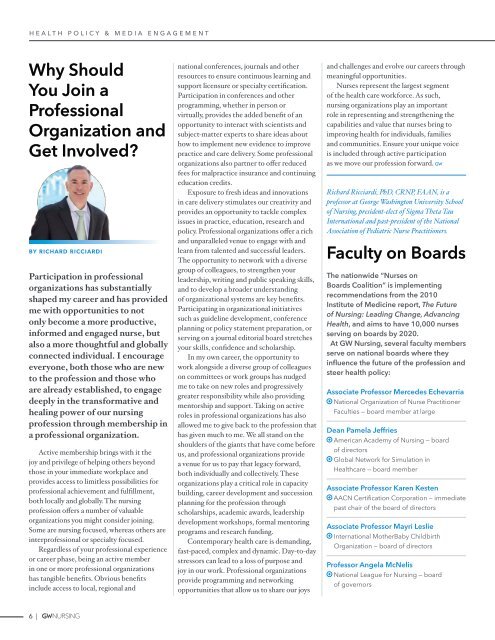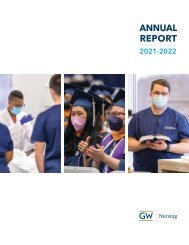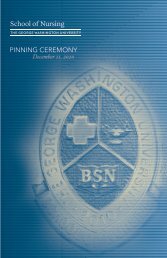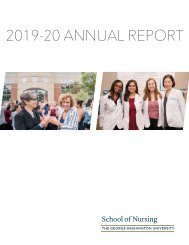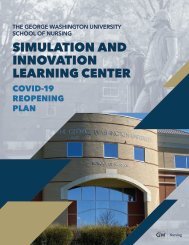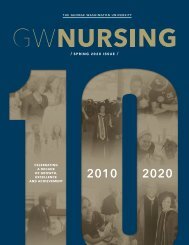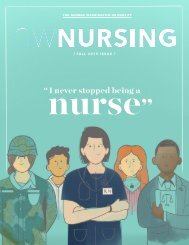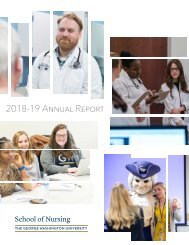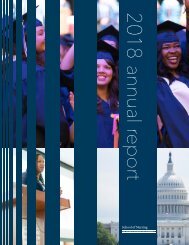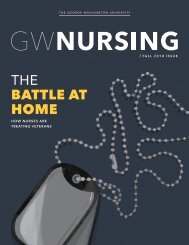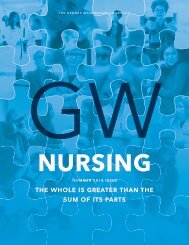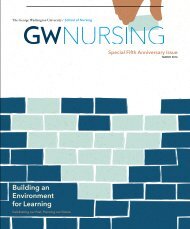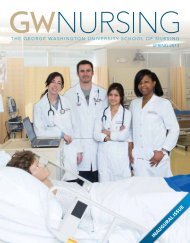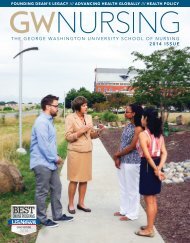GW Nursing Magazine Spring 2019
GW Nursing is a publication of the George Washington University School of Nursing. The magazine tells the story of GW nurses and their endeavors in the areas of education, research, policy and practice.
GW Nursing is a publication of the George Washington University School of Nursing. The magazine tells the story of GW nurses and their endeavors in the areas of education, research, policy and practice.
You also want an ePaper? Increase the reach of your titles
YUMPU automatically turns print PDFs into web optimized ePapers that Google loves.
health policy & media engagement<br />
Why Should<br />
You Join a<br />
Professional<br />
Organization and<br />
Get Involved?<br />
by richard ricciardi<br />
Participation in professional<br />
organizations has substantially<br />
shaped my career and has provided<br />
me with opportunities to not<br />
only become a more productive,<br />
informed and engaged nurse, but<br />
also a more thoughtful and globally<br />
connected individual. I encourage<br />
everyone, both those who are new<br />
to the profession and those who<br />
are already established, to engage<br />
deeply in the transformative and<br />
healing power of our nursing<br />
profession through membership in<br />
a professional organization.<br />
Active membership brings with it the<br />
joy and privilege of helping others beyond<br />
those in your immediate workplace and<br />
provides access to limitless possibilities for<br />
professional achievement and fulfillment,<br />
both locally and globally. The nursing<br />
profession offers a number of valuable<br />
organizations you might consider joining.<br />
Some are nursing focused, whereas others are<br />
interprofessional or specialty focused.<br />
Regardless of your professional experience<br />
or career phase, being an active member<br />
in one or more professional organizations<br />
has tangible benefits. Obvious benefits<br />
include access to local, regional and<br />
national conferences, journals and other<br />
resources to ensure continuous learning and<br />
support licensure or specialty certification.<br />
Participation in conferences and other<br />
programming, whether in person or<br />
virtually, provides the added benefit of an<br />
opportunity to interact with scientists and<br />
subject-matter experts to share ideas about<br />
how to implement new evidence to improve<br />
practice and care delivery. Some professional<br />
organizations also partner to offer reduced<br />
fees for malpractice insurance and continuing<br />
education credits.<br />
Exposure to fresh ideas and innovations<br />
in care delivery stimulates our creativity and<br />
provides an opportunity to tackle complex<br />
issues in practice, education, research and<br />
policy. Professional organizations offer a rich<br />
and unparalleled venue to engage with and<br />
learn from talented and successful leaders.<br />
The opportunity to network with a diverse<br />
group of colleagues, to strengthen your<br />
leadership, writing and public speaking skills,<br />
and to develop a broader understanding<br />
of organizational systems are key benefits.<br />
Participating in organizational initiatives<br />
such as guideline development, conference<br />
planning or policy statement preparation, or<br />
serving on a journal editorial board stretches<br />
your skills, confidence and scholarship.<br />
In my own career, the opportunity to<br />
work alongside a diverse group of colleagues<br />
on committees or work groups has nudged<br />
me to take on new roles and progressively<br />
greater responsibility while also providing<br />
mentorship and support. Taking on active<br />
roles in professional organizations has also<br />
allowed me to give back to the profession that<br />
has given much to me. We all stand on the<br />
shoulders of the giants that have come before<br />
us, and professional organizations provide<br />
a venue for us to pay that legacy forward,<br />
both individually and collectively. These<br />
organizations play a critical role in capacity<br />
building, career development and succession<br />
planning for the profession through<br />
scholarships, academic awards, leadership<br />
development workshops, formal mentoring<br />
programs and research funding.<br />
Contemporary health care is demanding,<br />
fast-paced, complex and dynamic. Day-to-day<br />
stressors can lead to a loss of purpose and<br />
joy in our work. Professional organizations<br />
provide programming and networking<br />
opportunities that allow us to share our joys<br />
and challenges and evolve our careers through<br />
meaningful opportunities.<br />
Nurses represent the largest segment<br />
of the health care workforce. As such,<br />
nursing organizations play an important<br />
role in representing and strengthening the<br />
capabilities and value that nurses bring to<br />
improving health for individuals, families<br />
and communities. Ensure your unique voice<br />
is included through active participation<br />
as we move our profession forward.<br />
Richard Ricciardi, PhD, CRNP, FAAN, is a<br />
professor at George Washington University School<br />
of <strong>Nursing</strong>, president-elect of Sigma Theta Tau<br />
International and past-president of the National<br />
Association of Pediatric Nurse Practitioners.<br />
Faculty on Boards<br />
The nationwide “Nurses on<br />
Boards Coalition” is implementing<br />
recommendations from the 2010<br />
Institute of Medicine report, The Future<br />
of <strong>Nursing</strong>: Leading Change, Advancing<br />
Health, and aims to have 10,000 nurses<br />
serving on boards by 2020.<br />
At <strong>GW</strong> <strong>Nursing</strong>, several faculty members<br />
serve on national boards where they<br />
influence the future of the profession and<br />
steer health policy:<br />
Associate Professor Mercedes Echevarria<br />
National Organization of Nurse Practitioner<br />
Faculties — board member at large<br />
Dean Pamela Jeffries<br />
American Academy of <strong>Nursing</strong> — board<br />
of directors<br />
Global Network for Simulation in<br />
Healthcare — board member<br />
Associate Professor Karen Kesten<br />
AACN Certification Corporation — immediate<br />
past chair of the board of directors<br />
Associate Professor Mayri Leslie<br />
International MotherBaby Childbirth<br />
Organization — board of directors<br />
Professor Angela McNelis<br />
National League for <strong>Nursing</strong> — board<br />
of governors<br />
6<br />
|


